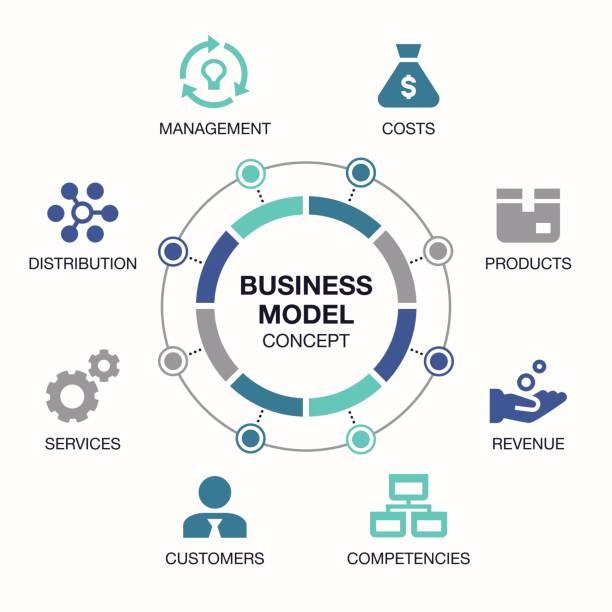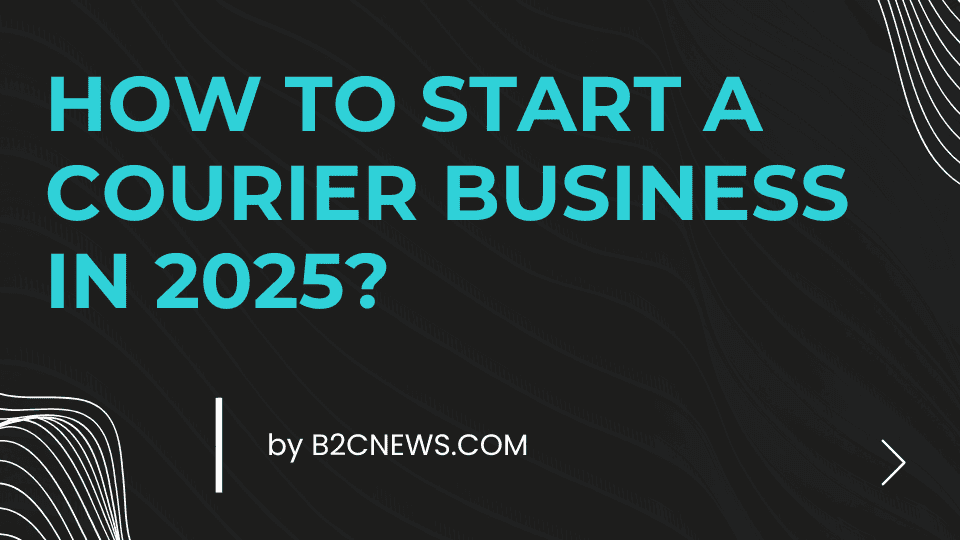In a world where speed is everything, courier businesses have become the backbone of modern commerce. From online shopping to critical document deliveries, businesses and individuals alike are demanding faster, more reliable delivery services. With eCommerce sales skyrocketing and customer expectations shifting toward same-day or even one-hour deliveries, the courier industry is witnessing a major boom. According to Statista, the global courier and delivery services market was valued at over $400 billion in 2023, and it’s only projected to grow further.
Consumers expect convenience, and businesses are looking for last-mile delivery solutions that won’t cost them a fortune. Companies like Amazon have set the bar high with ultra-fast shipping, forcing smaller logistics providers to step up their game. But here’s the silver lining: with the right strategy, branding, and operational efficiency, even a small business in the courier industry can carve out a profitable niche.
So, if you’ve ever thought about launching your own courier service business, now is the time. This step-by-step guide will walk you through everything—from setting up a business plan to scaling operations—so you can build a successful courier business people rave about.
Key Takeaway: The demand for fast, reliable, and affordable delivery services is at an all-time high. A well-structured courier business in 2025 can thrive if it meets the evolving needs of both businesses and consumers
Laying the Foundation for Your Courier Business
Identifying Your Niche
The courier industry is vast, and jumping in without a well-defined niche is like shooting in the dark. To stand out, you need to specialize. Here are some types of courier services to consider:
- Local Delivery Services – Small businesses, florists, and bakeries need quick, same-day delivery within a specific city or region.
- eCommerce Logistics – Many online stores require third-party couriers to handle their shipments efficiently.
- Medical Courier Services – Transporting lab samples, prescriptions, and medical supplies requires precision, security, and speed.
- Legal Document Courier – Law firms, real estate agencies, and courts need confidential and time-sensitive packages and documents.
- On-Demand Gig Economy Deliveries – Working with food delivery services, personal shoppers, or freelance courier jobs.
Choosing a niche will help you tailor your services you offer, pricing, and marketing efforts to a specific audience. It will also make it easier to differentiate your courier business from competitors.
Crafting a Solid Business Plan

Starting without a business plan is a recipe for disaster. A courier business plan should outline:
- Market Analysis – Who are your competitors? What’s the target market like? Are there underserved areas in your geographic area?
- Startup Costs & Budgeting – How much cost to start a courier business? Consider expenses for vehicles, fuel costs, insurance, and marketing.
- Revenue Model – Will you charge per delivery of packages, offer subscription-based business offers, or partner with businesses for bulk orders?
- Growth Strategy – How do you plan to scale? Will you expand regionally, add new premium services, or invest in automation?
A well-researched business plan isn’t just for personal guidance—it’s crucial for securing funding from banks or investors.
Choosing the Right Business Structure

Before making your first courier delivery, you need to choose a legal structure. Here are the most common options:
- Sole Proprietorship – Simple and easy and quick to set up but offers no liability protection.
- LLC or Corporation – A great middle ground that protects personal assets while keeping business operations flexible.
Register your business, obtain necessary permits, and apply for a federal identification number from the IRS to ensure compliance with tax laws.
Key Takeaway: Picking a niche and crafting a solid business plan lays the groundwork for a well-managed courier business. Without a business plan, you’re setting yourself up for failure.
Navigating Legal and Regulatory Requirements
Obtaining Necessary Licenses and Permits
Every courier company must comply with legal requirements at the local, state, and federal levels. Depending on where you operate, you may need:
- A business license from your city or business in a specific state
- A commercial driver’s license (CDL) if your fleet includes larger trucks
- Special permits if handling medical, hazardous, or restricted items
If you plan to start a delivery service across state lines, you may also need additional permits.
Securing Appropriate Insurance Coverage
Business insurance is critical in the courier market. Consider these essential policies:
- General Liability Insurance – Covers accidents, injuries, and property damage.
- Commercial Auto Insurance – Protects your vehicles in case of accidents.
- Cargo Insurance – Covers loss or damage to packages and documents during transit.
Key Takeaway: Staying legally compliant and insured isn’t optional—it’s essential for achieving business success.
Understanding Compliance and Safety Standards
Couriers must comply with safety regulations to protect both employees and customers. This includes:
- Adhering to road safety laws and maintaining vehicles in top condition.
- Data protection compliance for handling confidential deliveries like medical records or legal documents.
- Proper training for employees to handle fragile or sensitive deliveries correctly.
Key Takeaway: Staying legally compliant and insured isn’t optional—it’s essential. Failing to obtain the right licenses or insurance can put your entire courier business at risk.
Building Your Fleet and Infrastructure
Selecting Suitable Vehicles
Your delivery vehicle is the lifeline of your business. Choose wisely based on:
- Size & Cargo Space – A small van may work for local deliveries, while larger trucks are better for bulk shipments.
- Fuel Efficiency – Rising fuel prices make hybrid or electric vehicles a smart investment.
- Maintenance Costs – A reliable, low-maintenance vehicle saves money in the long run.
Leasing vs. Buying – If you’re low on capital, leasing might be the better option. But if you plan to expand, owning your fleet offers more control.
Implementing Technology Solutions
Modern courier businesses thrive on efficiency. Investing in route optimization software and online booking platforms can make a massive difference:
- Real-Time Tracking – Customers expect delivery updates and transparency.
- Automated Dispatching Systems – Helps help you manage working hours efficiently.
- Management Software – Reduces errors and ensures timely deliveries.
Key Takeaway: The right software and online booking platforms will determine your efficiency, profitability, and ability to provide personalized service.
Warehouse & Logistics Setup
If handling high-volume deliveries, a well-organized warehouse or distribution center may be necessary. Efficient logistics management ensures faster turnaround times and better inventory tracking.
Key Takeaway: Investing in the right vehicles and technology will determine your courier business’s efficiency and profitability. Cutting corners here can lead to slow, inefficient deliveries and frustrated customers.
Developing a Winning Marketing Strategy

Branding Your Courier Service
Branding isn’t just about a fancy logo—it’s about creating a memorable identity that sticks in people’s minds. When customers think of fast, reliable deliveries, you want them to think of your company.
- Create a compelling brand name – Make it catchy, easy to remember, and relevant to your services.
- Design a professional logo – A clean, modern logo on your vehicles, website, and uniforms boosts credibility.
- Define your unique selling proposition (USP) – Are you the fastest, most affordable, or most eco-friendly courier in town? Make it clear.
- Use consistent branding – From social media to business cards, ensure your brand identity stays uniform across all platforms.
Take inspiration from companies like FedEx and DHL—they’ve mastered branding by making their colors, logos, and slogans instantly recognizable.
Leveraging Digital Marketing
In today’s digital world, if your business isn’t online, it might as well not exist. Here’s how to establish a strong digital presence:
- SEO for Local Search – Optimize your website with keywords like “same-day delivery service near me” or “best courier company in [your city]” to rank higher on Google.
- Social Media Presence – Platforms like Instagram, Facebook, and LinkedIn are great for building credibility and engaging with customers.
- Google My Business (GMB) Listing – Claiming and optimizing your GMB profile ensures you show up in local searches.
- Online Reviews & Testimonials – Encourage happy customers to leave reviews; they build trust and boost rankings.
- Pay-Per-Click (PPC) Ads – Invest in Google Ads and Facebook Ads to drive targeted traffic to your website.
Building Relationships with Clients
Marketing doesn’t stop once a customer books a delivery. Long-term success relies on relationship-building:
- Network with local businesses – Partnering with retailers, restaurants, and eCommerce stores guarantees repeat business.
- Offer referral incentives – Give discounts to customers who refer new clients. Word-of-mouth is powerful.
- Provide outstanding customer service – A single bad experience can spread like wildfire online, so prioritize customer satisfaction.
Key Takeaway: Marketing isn’t just about gaining customers—it’s about keeping them. A strong brand, a powerful online presence, and excellent customer service will keep your courier business top-of-mind.
Managing Operations Efficiently
Hiring and Training Staff
Your drivers and support staff are the face of your business. Hiring the right people and training them well will set your company apart.
- Hire reliable and professional drivers – They should have clean driving records, be punctual, and have excellent customer service skills.
- Train employees on delivery protocols – Proper package handling, customer interaction, and problem-solving should be part of the training.
- Use background checks – Trust is crucial in the courier market, especially if handling sensitive deliveries.
Establishing Standard Operating Procedures (SOPs)
Without clear SOPs, your operations can become chaotic. Key areas to define include:
- Scheduling & Dispatching – Automated dispatching software can assign deliveries based on location and priority.
- Package Handling Guidelines – Fragile items need special handling, while high-value packages may require additional security measures.
- Customer Support Protocols – How should employees handle complaints, delays, or lost packages? A solid process ensures consistency.
Monitoring Performance and Ensuring Quality
Tracking your key performance indicators (KPIs) will help you identify bottlenecks and improve efficiency. Important KPIs include:
- On-time delivery rate – The percentage of packages delivered within the promised time frame.
- Customer satisfaction score – Gather feedback through surveys or reviews.
- Cost per delivery – Ensure profitability by balancing operational costs and pricing.
Regular audits and performance reviews can help fine-tune processes and maintain service excellence.
Key Takeaway: Efficient operations require a well-trained team, clear standard procedures, and performance tracking to ensure top-notch service.
Scaling Your Courier Business
Expanding Service Areas
If business is booming, it might be time to extend your reach. Here’s how to do it successfully:
- Research demand in new regions – Expanding without demand can be costly, so conduct market research first.
- Consider franchising or partnerships – If managing multiple locations isn’t feasible, a franchise model might be a smart alternative.
- Optimize logistics – More locations mean more complex logistics. Invest in route optimization software to keep deliveries efficient.
Diversifying Service Offerings
Expanding your service portfolio can unlock new revenue streams. Some options include:
- Subscription-based delivery services – Offer monthly packages for frequent users.
- Cold chain logistics – Deliver temperature-sensitive items like food and medicine.
- White-label logistics for eCommerce brands – Many online stores prefer third-party couriers with branded packaging.
Investing in Advanced Technologies
Technology is reshaping the courier market. If you want to stay ahead, consider:
- AI-powered route planning – Reduces fuel costs and improves delivery efficiency.
- Drones & autonomous vehicles – Though still emerging, these could be game-changers in the near future.
- Eco-friendly solutions – Electric vehicles and sustainable packaging can attract eco-conscious customers.
Key Takeaway: Growth doesn’t just mean expanding your delivery area—it also means evolving your services and staying ahead of tech trends.
Conclusion
Building a courier business that people can’t stop talking about isn’t just about having a fleet of vehicles—it’s about creating a seamless, reliable, and customer-focused delivery service. From choosing the right niche to leveraging technology and scaling operations, every step plays a crucial role in your success.
The courier market is booming, but competition is fierce. To stand out, focus on efficiency, strong branding, and exceptional customer service. Keep up with industry trends, embrace digital marketing, and always look for ways to innovate. Whether you’re delivering locally or aiming for nationwide expansion, the key to success is consistency, reliability, and adaptability.
By following this guide, you’ll be on the path to building a courier business that people not only trust but also rave about.
Key Takeaway: Success in the courier business comes down to smart planning, efficient operations, and keeping customers at the heart of everything you do.
Bullet-Point Summary
- Understand the demand – The courier industry is growing rapidly due to eCommerce and evolving customer expectations.
- Find your niche – Specializing in a specific type of delivery (medical, legal, eCommerce) can give you a competitive edge.
- Have a solid business plan – Define your revenue model, budget, and growth strategy.
- Stay compliant – Obtain necessary licenses, permits, and insurance coverage.
- Invest in vehicles and technology – Use route optimization, tracking, and automated dispatching for efficiency.
- Market aggressively – Use SEO, social media, and local partnerships to attract clients.
- Optimize operations – Hire and train the right staff, implement SOPs, and track performance.
- Scale strategically – Expand into new regions, diversify services, and adopt emerging technologies.
FAQs
1. How much does it cost to start a courier business?
Startup costs vary based on location, fleet size, and service type. A small local courier business can start with as little as $10,000–$20,000, while larger operations require significantly more investment.
2. Do I need a commercial driver’s license (CDL) to start a courier business?
Not necessarily. If you operate small vehicles, a regular driver’s license may suffice. However, larger trucks or hazardous material transport may require a CDL.
3. How do I get my first customers for my courier business?
Start by networking with local businesses, optimizing your website for local SEO, and listing your business on Google My Business. Offering discounts for first-time customers can also attract initial clients.
4. What are some common challenges in running a courier business?
Some challenges include fuel costs, vehicle maintenance, competition from major carriers, and meeting fast delivery expectations. Effective cost management and customer service help overcome these obstacles.
5. How can I make my courier business eco-friendly?
Consider using electric or hybrid vehicles, offering carbon-neutral shipping options, and using sustainable packaging materials. Green initiatives can also attract environmentally-conscious customers.
Sources
- Statista – Global Courier Market Value
- Wix Blog – How to Start a Courier Business
- FreshBooks – How to Start a Courier Business
- U.S. Small Business Administration – Business Licensing Requirements

